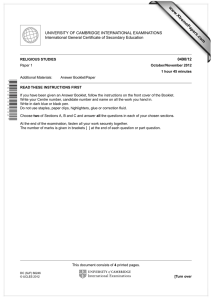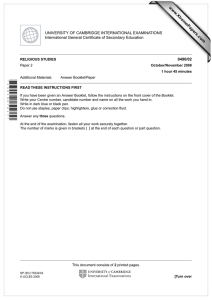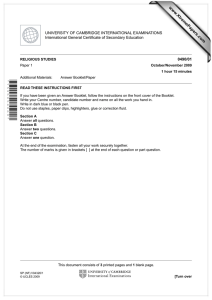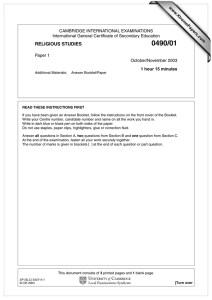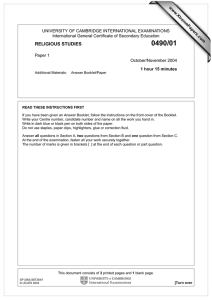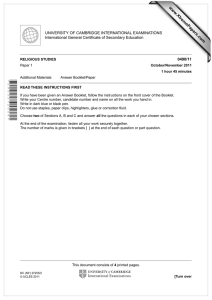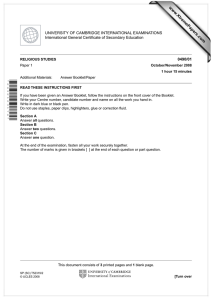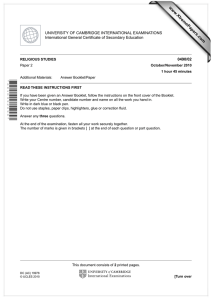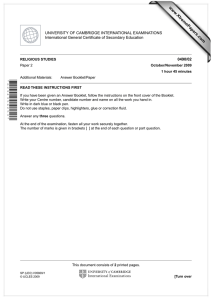www.XtremePapers.com
advertisement
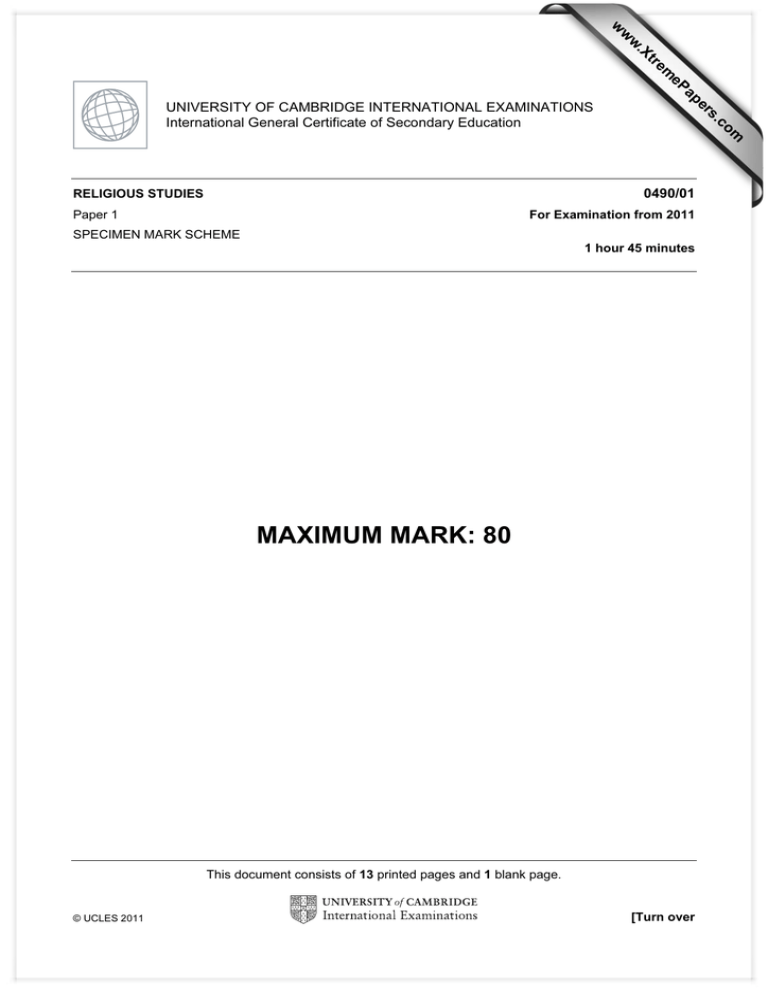
w w om .c s er RELIGIOUS STUDIES ap eP m e tr .X w UNIVERSITY OF CAMBRIDGE INTERNATIONAL EXAMINATIONS International General Certificate of Secondary Education 0490/01 For Examination from 2011 Paper 1 SPECIMEN MARK SCHEME 1 hour 45 minutes MAXIMUM MARK: 80 This document consists of 13 printed pages and 1 blank page. © UCLES 2011 [Turn over 2 In an examination of this kind, it is impossible to devise a mark scheme that will cover all acceptable answers. This mark scheme provides guidance on what to look out for in the answers given by the candidates. This means that you must be prepared to use discretion in deciding what constitutes an acceptable answer. In order to ensure that all examiners mark at a uniform level, you are expected regularly to discuss your marking with your Team Leader, especially any examples or forms of answer that differ greatly from the agreed mark scheme. Team Leaders are expected to discuss answers with the Principal Examiner. The mark scheme is discussed at the co-ordination meeting. When marking, all examiners are expected to adhere to what has been agreed. Before starting to mark scripts, please ensure that you are familiar with the syllabus. PRINCIPLES UNDERLYING THE MARK SCHEME. Candidates are tested on their ability to satisfy three general Assessment Objectives: Assessment Objective A. KNOWLEDGE. Candidates should be able to: 1 2 use knowledge in order to describe the religious practices, experiences and beliefs of others select and deploy relevant knowledge of the religion studied. Assessment Objective B. UNDERSTANDING AND INTERPRETATION. Candidates should be able to: 3 4 Show understanding of religious beliefs and practices by explaining their significance for believers demonstrate awareness and understanding of religious responses to contemporary issues both personal and social. Assessment Objective C. EVALUATION. Candidates should be able to: 5 evaluate different views on issues arising from religious belief and practice by using evidence and argument. Paper 1 is marked out of 80. Candidates choose TWO religions from: Section A – Christianity Section B – Islam Section C – Judaism and answer ALL the questions in each of the chosen sections. This means candidates will answer FOUR questions with a total of 20 marks each. In part (a) of questions, Assessment Objective A, Knowledge is sometimes marked by point marking. This will be indicated on the mark scheme. All other answers are marked according to the level descriptors for the different assessment objectives shown on the 0490 Levels of Response table. © UCLES 2011 0490/01/SM/11 [Turn over 3 LEVELS OF RESPONSE The statements which follow should be used to determine the appropriate level of response for each objective. They should be applied as appropriate to the question and as the assessment of the work of an average 16 year old. The guiding principle for Examiners in applying the Mark Scheme to answers is to remember the concept of Positive Awarding. Therefore, marks should be awarded for appropriate responses to reasonable interpretations of the question. In the Mark Scheme, there are no instances where answers are specifically excluded or required. What is included is information for Examiners, provided as guidance for what one might reasonably expect to find on a script. All appropriate answers therefore have the potential to be credited. It is perfectly possible for a candidate to achieve the highest level of response using a different argument or different information from that which appears in the Mark Scheme. It must be assumed that Examiners are capable of answering the questions on the paper and so they can award the appropriate level of response to the candidate. The detailed marking schemes are there as suggestions of what might be found in the answer. Examiners should not check whether the content of the marking schemes is in the answers but rather be guided by the Levels of Response and the concept of Positive Awarding. Checking on what is not in the answer almost always leads to lower marks than are indicated by the Levels of Response. Examiners should use the full range of marks available within the Levels of Response and not hesitate to award the maximum where it is deserved. Examiners must not exceed the total marks allowable for the Level achieved or the total allowable for the part of the question. Assessment objectives/Levels of Response A Knowledge (35%) Level Marks Marks Description 4 6–7 4–5 Very good/excellent attempt, demonstrates detailed knowledge. Shows a high level of skills in selection of appropriate information. Very good organisation and presentation with skilled use of technical terms. 3 4–5 3 Good attempt, wide knowledge, selects mostly relevant information, shows knowledge of technical terms with good organisation and presentation skills. 2 2–3 2 Valid/satisfactory attempt, fair knowledge. Competent selection of some relevant information. Moderate organisation and presentation with some use of technical terms. 1 1 1 Basic attempt, some knowledge and limited ability to select relevant information. 0 0 0 Answer absent/completely irrelevant. © UCLES 2011 0490/01/SM/11 [Turn over 4 B Understanding and interpretation (35%) Level Marks Description 4 6–7 Very good/excellent attempt, demonstrates a thorough understanding of religious beliefs, language and concepts. The ability to analyse and show clearly the relationship between belief and practice. Very good organisational and presentation skills. 3 4–5 Good attempt, demonstrates good understanding of religious beliefs, language and concepts. The ability to show the relationship between belief and practice. Good organisational and presentation skills. 2 2–3 Valid/satisfactory attempt, the ability to show some understanding of religious language and concepts. Some ability to show the relationship between belief and practice. Moderate organisation and presentation with some use of technical terms. 1 1 Basic attempt, limited ability to show understanding of religious language, concepts or practice. Little explanation offered. 0 0 Answer absent/completely irrelevant. C Evaluation (30%) Level Marks Description 4 6 Very good/excellent attempt demonstrates the ability to see the significance of specific issues and to express clearly a personal opinion supported by appropriate evidence and argument and also consider the argument for other views. 3 4–5 Good attempt, demonstrates the ability to see the significance of specific issues and express a personal opinion supported by some evidence and argument and to explain the argument for one or more other views. 2 2–3 Valid/satisfactory attempt, demonstrates some ability to see the significance of an issue and express a personal opinion with limited argument. Or, a simple expression of points of view. 1 1 Basic attempt, limited ability to see the significance of an issue or merely expresses a personal opinion. 0 Answer absent/completely irrelevant. © UCLES 2011 0490/01/SM/11 [Turn over 5 Choose two of Sections A, B and C and answer all the questions in each of your chosen sections. Section A – Christianity If you have chosen this section, answer all the questions. 1 (a) (i) What event in the life of Jesus do Christians remember during Lent? [2] Responses might include: The temptations of Jesus in the desert, by the devil. 1 mark for each response. (ii) How do Christians observe Lent? [5] Mark according to level descriptors for assessment Objective A. Knowledge. Responses might include: Ash Wednesday a time of penitence and fasting (some fast on Ash Wednesday and Good Friday). A period of self-sacrifice, living without luxuries, money saved on luxuries and sweets used for charity. Extra positive activities, helping others. Lent courses, study groups. Or, other local church activities might be described. (b) Explain why Holy Week is an important time for Christians. Mark according to level descriptors for Assessment Objective B. interpretation. [7] Understanding and Responses might explain some of the following: During Holy Week Christians remember the last week in the life of Jesus. Palm Sunday celebrates the triumphant entry of Jesus into Jerusalem at the beginning of the last week of his life. For Christians, this event signifies that Jesus was recognised as the Messiah. On Maundy (Holy) Thursday, Christians remember the Last Supper which was the first celebration of what became the Eucharist followed by Jesus’ arrest and sentence to crucifixion. Mourning for the death of Jesus begins with special services and prayers. Good Friday recalls the suffering and death on the cross. Some pilgrims in Jerusalem visit the Stations of the Cross and this is also carried out symbolically in some churches to remember the journey to the cross and the suffering of Jesus on that day. Saturday is the day Jesus lay in the tomb and churches are prepared for the great celebration of the resurrection on Easter Sunday. Easter Sunday is the most important festival in the church calendar. © UCLES 2011 0490/01/SM/11 [Turn over 6 (c) ‘Lent is still a very important time for Christians.’ Discuss this statement. Give your own opinion and show that you have thought about other points of view. You must refer to Christianity in your answer. [6] Mark according to the level descriptors for Assessment Objective C. Evaluation. Responses might consider some of the following: Many Christians today still observe Lent and use the time to reflect and pray and also to help others. Children are encouraged to observe some form of self-denial and save pocket money. It is seen as an important time of self-discipline and service. Some candidates, however might consider the view that Lent is not now observed as traditionally or strictly as it was in the past. Modern pressures make it difficult. Many people are unaware of the time or customs of Lent, concentrating only on the celebration of Easter. 2 ‘I believe in One God, Father, Son and Holy Spirit.’ (a) Describe the main beliefs stated in the Apostles’ Creed. [7] Mark according to level descriptors for Assessment Objective A. Knowledge. Responses might include: The main beliefs stated in the Apostles’ Creed are belief in one God, that God created heaven and earth. Belief in the Trinity, Father, Son and Holy Spirit. Jesus born of the Virgin Mary, crucified, died and was buried, the third day he rose again, ascended into heaven, to come again to judge the living and dead. A belief in the catholic (universal) church, the communion of saints, the forgiveness of sins and eternal life. (b) Explain why the Apostles’ Creed is important to Christians. [7] Mark according to level descriptors for Assessment Objective B. Understanding and interpretation. Reponses might explain some of the following: It is a statement of belief. The Apostles’ Creed is recited as a reminder of the key Christian beliefs and it is intended to make these beliefs clear and stop mistaken ideas developing. The beliefs stated in the creed are accepted by most Christian Churches. It is a way for Christians to publicly confirm their beliefs. It is important to Christians because it expresses the central beliefs about the Trinity and the nature of God as creator. It is a way of describing the Christian belief in the three aspects of one God; God as a Father, who cares for them, as the Son, Jesus, God incarnate, as the Holy Spirit, a force at work in the world through the universal church. The emphasis on the birth, suffering, death and resurrection of Jesus proves both his humanity and his messiahship. The creed also confirms the belief in salvation, that God is judge and that sins will be forgiven and there will be everlasting life. © UCLES 2011 0490/01/SM/11 [Turn over 7 (c) ‘How you live is more important than what you believe.’ Discuss this statement. Give your own opinion and show that you have thought about other points of view. You must refer to Christianity in your answer. [6] Mark according to level descriptors for Assessment Objective C. Evaluation. Responses might consider some of the following: Some candidates might consider that a person’s life is shaped by what they believe, Christians try to live ethical lives, respecting God and caring for others. Being good stewards of the created world because they are putting Christian teaching into practice. However, some responses might consider that ethical (good) living does not depend upon religious belief and might give examples. A balanced view might be that for Christians, how you live is part of what you believe, but for some others, beliefs and ideals about correct living might not be Christian and might be nonreligious. © UCLES 2011 0490/01/SM/11 [Turn over 8 Section B – Islam If you have chosen this section, answer all the questions. 3 (a) (i) What is the ummah? [2] Responses might include: The worldwide, Muslim community. The Nation of Islam. 1 mark for each response (ii) What is Zakah and how is it used? [5] Mark according to level descriptors for Assessment Objective A. Knowledge. Responses might include: Zakah is one of the Five Pillars. All Muslims are obliged to give two and a half percent of their wealth. This is after they have taken care of their families. A person does not pay Zakah unless his/her wealth is above a certain amount known as nisab. Zakah is given to the poor and needy (full details of other categories of recipients are not needed but they are: converts to Islam, prisoners of war and slaves, people in debt, travellers in need and those who work for the sake of Islam and collectors of Zakah). (b) Explain why Zakah is an important part of Muslim belief. [7] Mark according to level descriptors for Assessment Objective B. Understanding and interpretation. Responses might explain some of the following: Paying Zakah is obligatory because Allah commands it. The word Zakah means purity, giving Zakah is a means of purifying oneself from greed and selfishness. It stops Muslims from loving money and possessions. It is a form of worship and should be given with sincere intentions. Muslims believe that everything they have has been given to them by Allah in trust. For the poor, Zakah is not charity, it is the right of the poor as members of the Muslim community. By accepting Zakah, the poor are helping the rich to fulfil their obligations and store up true riches/gain reward from Allah. Zakah benefits the whole Muslim society. © UCLES 2011 0490/01/SM/11 [Turn over 9 (c) ‘The ummah is the most important feature of Islam.’ Discuss this statement. Give your own opinion and show that you have thought about other points of view. [6] Mark according to level descriptors for Assessment Objective C. Evaluation. Responses might consider some of the following: Responses might consider that one of the greatest strengths of Islam is the brotherhood among Muslims, which is typified by the ummah, the worldwide community of Muslims. Belief in the Five Pillars creates unity and brotherhood and Muslims are required to pray at least once a week in congregation at the mosque. Some candidates might consider other practical aspects/benefits of a strong religious community but also that other aspects of the religion such as God’s word, the Qur’an, his commands, the Five Pillars are of first importance. 4 According to the Qur’an, those who believe and live by their beliefs should have no fear of death nor should they grieve excessively for a loved one who dies. Death is a sad event but it is inevitable and believers should accept this. (a) Describe what happens at a Muslim funeral. [7] Mark according to level descriptors for Assessment Objective A. Knowledge. Responses might include: The Shahadah is recited to a dying person. The body is placed with the head in the direction of the quibla. Ghusl, relatives of the same sex, carry out ritual washing. Sometimes the dead person is dressed in ihram cloths. Martyrs are buried unwashed. Prayers are performed in the house of the dead person or in the mosque. As a sign of respect, men carry the body to the cemetery. At the cemetery Salat-ul-Janaz is said at the graveside, there are no prostrations. Al-Fateha (Surah 1) is recited. Muslims are buried with the head facing Makkah. Prayers are said for the forgiveness of the dead and the hope that the person will achieve Paradise. Seven days later relatives will visit the grave. © UCLES 2011 0490/01/SM/11 [Turn over 10 (b) Explain the Muslim belief in Akirah (life after death). [7] Mark according to level descriptors for Assessment Objective B. Understanding and interpretation. Responses might explain some of the following: Muslims believe that this life is a preparation for the next life, Akirah, life after death. Muslims believe that life on earth is a test and that every thought and action will be judged. Muslims believe in resurrection of the body at the Last Day and the dead will rise to join the living. There will be judgement by Allah, all actions, however small, will have to be accounted for. The good/believers will be rewarded with Paradise and the bad/unbelievers will be punished with Hell. The afterlife is beyond human imagination and it will last forever. Belief in Akirah can influence the behaviour of Muslims in their present life. (c) ‘Rich and poor are alike in death.’ Discuss this statement. Give your own opinion and show that you have thought about other points of view. You must refer to Islam in your answer. [6] Mark according to level descriptors for Assessment Objective C. Evaluation. Responses might consider some of the following: Candidates might consider that death can be seen to equalise rich and poor as material possessions have no value after death. Muslim burial rites are the same for rich or poor and are intended to show that the person has left the material world – the wrapping of the body in pilgrim cloth, no coffin, a simple ceremony, all immediately after death. Responses might comment that it will be a person’s life that will be judged. For Muslims, obedience to the commands of Allah, as revealed in the Qur’an and by the prophets will be the criteria by which they are judged, not rich or poor. Some might conclude that achieving this might be harder for some rich people or that all could fail equally. © UCLES 2011 0490/01/SM/11 [Turn over 11 Section C – Judaism If you have chosen this section, answer all the questions. 5 (a) Describe what happens at a Brit Milah ceremony. [7] Mark according to level descriptors for Assessment Objective A. Knowledge. Responses might include: A woman takes the child from his mother and carries him on a cushion, to the room where the men are assembled. A trained man, called a mohel, performs the circumcision; sometimes the mohel will be a doctor. The child is taken by the mohel and placed, firstly on the empty Chair of Elijah and then taken and put on the knee of the Sandek (who might be the grandfather or a respected member of the congregation). After the circumcision is performed, the father recites a blessing to say that God has commanded this operation so that the child can enter the Covenant. The mohel or the Rabbi blesses the child and names him. The child, still on the cushion, is taken back to his mother. After the ceremony there is usually a festive meal. (b) Explain why Jews believe they have a special relationship with God. [7] Mark according to level descriptors for Assessment Objective B. Understanding and interpretation. Responses might explain some of the following: Candidates might explain that Jews understand their relationship with God in terms of a covenant where both parties agree to look after each other’s interests. Jews believe that God chose them as a holy nation, to dedicate themselves to serve him and prepare the world for a future time of peace and justice when all people will be united and recognise God. Through Covenants with Abraham and Moses, God made it known that he had chosen the Jews and gave them rules and commands on how to live, as an example of how he wanted all people to live. Jews believe that this places a special obligation on them to obey all God’s commands to help fulfil his plans and bring holiness into the world. Jews believe that God has fulfilled his part of the covenant by rescuing them from slavery and promising never to abandon them. © UCLES 2011 0490/01/SM/11 [Turn over 12 (c) ‘Jewish dedication to keeping their laws is a good example to others.’ Discuss this statement. Give your own opinion and show that you have thought about other points of view. [6] Mark according to level descriptors for Assessment Objective C. Evaluation. Responses might consider some of the following: Jews are dedicated to keeping their laws because they believe they have to set an example. They believe it is worse for them to fall short of God’s standard than for other people to do so. This dedication can be seen to be a good example because all religious believers desire to obey God’s wishes. Some candidates might argue the laws of Judaism are too specialised for others to relate to and how Jews behave bears no relation to how others wish to behave e.g. dietary laws and dress. Some people consider Jews to be over obsessed with laws and rules. Another view might be that not all Jews are dedicated to keeping all the laws in their original form and that changing some laws to suit modern times, enabling more people to obey the spirit of the law is also a good example. 6 Picture stimulus of a sukkah. (a) Describe how Jews celebrate the festival of Sukkot. [7] Mark according to level descriptors for Assessment Objective A. Knowledge. Responses might include some of the detailed description below: The commandment in the Torah is to live in a sukkah for seven days but an extra day is added in the Diaspora. At the beginning and end of the festival no work is done except food preparation. The sukkah is built outside the home or synagogue. The roof must be of natural material and cut specially, the branches of an overhanging tree cannot be used. The inside of the sukkah is decorated with fruits and ushpizzin, pictures of the patriarchs. Jews eat in the sukkah and entertain visitors there. The lulav and etrog are waved and a blessing said each morning during Sukkot except for the Sabbath. In the synagogue, the lulav and etrog are paraded around the synagogue with the scrolls. Each day of Sukkot symbolic actions occur in the synagogue. These include dressing the synagogue in white, parading the scrolls, praying for water, beating the floor with willow, reading the Torah. On the last day of the festival no work is done. At the synagogue, the readings remind people to give to the poor and that all loans must be cancelled at the end of seven years. © UCLES 2011 0490/01/SM/11 [Turn over 13 (b) Explain why Sukkot is an important festivals for Jews. Mark according to level descriptors for Assessment Objective B. interpretation. [7] Understanding and Responses might explain some of the following: Three times in the Torah, Jews are told to rejoice on Sukkot. They are instructed to dwell in booths (huts) so that each generation will know that their ancestors suffered hardship during the exodus from Egypt. Living in the sukkah reinforces the link with their ancestors. The huts provided shelter for the Israelites and by living in the sukkah families and communities unite in remembrance. The lulav and etrog are known as the four species and represent the gathering of the harvest. They are also thought to represent the different ways people react to the Torah and their acts of goodness and religious duty. The festival includes prayers for rain for the growth of crops. (c) ‘Festivals are necessary in order to make worship enjoyable.’ Discuss this statement. Give your own opinion and show that you have thought about other points of view. You must refer to Judaism in your answer. [6] Mark according to level descriptors for Assessment Objective C. Evaluation. Responses might consider some of the following: Celebrating festivals is a fun way to practise religion. In Judaism the festivals celebrate the history of the Jewish people and their relationship with God. Examples like living in the sukkah, the Pesach meal help history and worship come to life. The Torah commands Jews to keep the festivals and the instruction to do no work is a very strict one, so festivals enable everyone to enjoy worship. Candidates might also consider whether worship in other forms is enjoyable e.g. when taking place in the home or synagogue or through performing mitzvah. A conclusion might be that festivals are interesting and can be fun and this is meant to enhance rather than disguise the fact that they have a serious religious meaning and are worship. © UCLES 2011 0490/01/SM/11 14 BLANK PAGE © UCLES 2011 0490/01/SM/11
